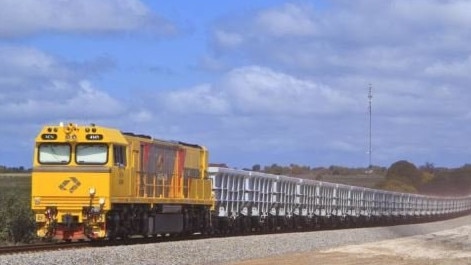Aurizon pays $2.35bn for One Rail as it looks to boost earnings beyond coal
Aurizon will pay $2.35bn to acquire Macquarie Asset Management’s One Rail Australia haulage business.

Aurizon will pay $2.35bn to acquire Macquarie Asset Management’s One Rail Australia haulage business, as the transport major looks to grow its business beyond coal.
One Rail, formerly known as Genesee & Wyoming Australia, operates rail networks in South Australia and the Northern Territory, and has a substantial coal haulage business in the NSW Hunter Valley, where it has a long-term contract to move Glencore’s thermal coal to the port.
Aurizon’s acquisition comes only two years after Macquarie Asset Management took control of the operation from US rail major Genesee & Wyoming, with Aurizon as a failed bidder in the process, in a deal said to value the business at about $2bn.
The deal, first mooted in Data Room, will see Aurizon expand its business in Central Australia, with Aurizon saying it will divest One Rail’s Hunter Valley and Queensland coal haulage operations to allay any potential concerns from the competition regulator.
It will keep the South Australian and Northern Territory operations – including the Tarcoola-to-Darwin rail infrastructure, five rail yards, 68 active locomotives, about 1000 wagons and around 400 employees.
Aurizon said One Rail booked EBITDA of $220m last financial year.
Managing director Andrew Harding said the acquisition offered a “unique” chance to grow Aurizon’s national footprint.
Mr Harding told The Australian One Rail’s Tarcoola-Darwin line, of which it is the economic owner, is one of the cheapest rail haulage lines in the country, easily outcompeting truck haulage for goods moving across Central Australia.
Unlike rail movements on more congested east coast lines, the vast open spaces on One Rail’s route allow trains as long as 1800m, hauling as many as 250 to 260 shipping containers at a time – three times as many as can be hauled on other routes.
“I‘ve driven beside the route of that railway track for a considerable distance and there is not a lot of trucking that’s occurring, because a fair bit of it is on rail,” Mr Harding said.
Mr Harding said volume growth on the line was likely to come from development of the array of mining and exploration projects along the route, which runs through vast swathes of some of Australia’s most prospective copper districts, and offers a route to market for South Australian magnetite iron ore projects, as well as potential lithium and other battery metals mines.
He said the lack of alternative infrastructure in Central Australia could even lead to its use by mining projects on the other side of the WA border, such as OZ Minerals’ West Musgrave project, or even carry output from the rich mining region around Mt Isa in Queensland to Darwin port.
Although resurgent coal prices have helped brighten Aurizon’s outlook in the short term, the rail hauler has been looking to diversify beyond its coal haulage business for some time.
Mr Harding told analysts at the company’s investor day in June he wanted to double Aurizon’s earnings from non-coal, or bulk, haulage over the next decade, saying the company’s “worst case” outlook could see coal volumes halve over the next 20 years.
“The One Rail acquisition delivers a step change for Aurizon Bulk as a new entrant in the SA and NT region, and supports the ongoing growth of non-coal revenue in the Aurizon portfolio,” he said.
“Upon completion of the transaction, with the integration of One Rail bulk and divestment of ECR, the bulk share of Aurizon’s haulage revenue will represent around 40 per cent.”
One Rail hauls about 14 million tonnes of iron ore, gypsum, grain, manganese and copper on its South Australian and Northern Territory lines each year, with the business worth about $245m in revenue and EBITDA of $80m.
Its Queensland and NSW coal business, which will be run independently of Aurizon until a trade sale or spin-off is settled, has annual revenue of $230m, Aurizon said, and earnings of $140m, and hauls about 50 million tonnes of coal each year – primarily in the Hunter Valley, where it has contracts with Glencore.
The sale could see Aurizon recoup a substantial proportion of its initial One Rail outlay, with the business valued at up to 10 times EBITDA.
Aurizon shares sank on the announcement of the deal, down 24c to close at $3.65 on Friday, after analysts warned the future sale of One Rail’s coal business could be difficult for Aurizon.
RBC analyst Own Birrell told clients the lack of investor interest in coal-related assets could mean Aurizon does not get the full value from a sale.
“We expect the pool of buyers is not likely to be too extensive and so a demerger is a possibility. While the transaction is in line with similar transactions we question whether Aurizon will be able to divest the east coast rail assets at this multiple now that it is a forced seller,” he said.
“Any discount applied to East Coast Rail on a divestment or demerger would ultimately be borne by existing shareholders.”


To join the conversation, please log in. Don't have an account? Register
Join the conversation, you are commenting as Logout